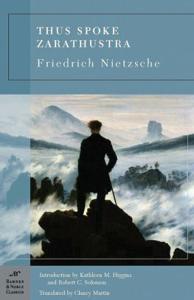
Want to learn the ideas in Thus Spoke Zarathustra better than ever? Read the world’s #1 book summary of Thus Spoke Zarathustra by Friedrich Nietzsche here.
Read a brief 1-Page Summary or watch video summaries curated by our expert team. Note: this book guide is not affiliated with or endorsed by the publisher or author, and we always encourage you to purchase and read the full book.
Video Summaries of Thus Spoke Zarathustra
We’ve scoured the Internet for the very best videos on Thus Spoke Zarathustra, from high-quality videos summaries to interviews or commentary by Friedrich Nietzsche.
1-Page Summary of Thus Spoke Zarathustra
Overview
Zarathustra is a sage who has a great love for humanity. He wants to teach the people of his village about this truth, but they don’t believe him and think he’s crazy. Zarathustra realizes that his teachings must be more subtle so that the villagers will listen to him.
Zarathustra is a prophet who has ideas about the future of humanity. He believes that some day, mankind will be better than he is now and reach the state of overman. To become this overman, one must have a sense of envy, be able to fight for what they need or want in life, and not feel pity for others (beyond basic human sympathy). Zarathustra teaches his ideas to disciples who listen but do not understand at first because they are too attached to their own ways of thinking. After Zarathustra departs from them with sadness, his disciples realize just how much they have learned from him and decide to spread the word themselves.
Oral reports can be performed as lectures or speeches where an audience listens passively; as expositions where listeners ask questions or make comments; as debates between two opposing sides on an issue; or even group discussions where everyone voices opinions. In any case it should convey information clearly in order to achieve its purpose—to inform the listener without overwhelming him or her with details—but also entertain if possible through audiovisual effects such as music and slideshows.
Zarathustra is an ancient Persian prophet who lived on a mountain. He has many followers, but he feels they have misinterpreted his teachings. So, Zarathustra leaves the mountain and goes to find his disciples in the Blessed Isles. There, he learns that his disciples are trying to combine Christianity with what Zarathustra taught them about overcoming humanity’s weaknesses and achieving greatness by becoming “overmen.” However, this will never work because Zarathustra’s teachings are pure while Christianity holds people back from realizing their full potential as human beings.
Zarathustra then attacks the religious leaders who still believe in a dead God and argues with scholars who would replace God with other pursuits of knowledge. These pursuits are not what Zarathustra taught, he says, and those who follow them are just as foolish as the zealots.
He then attacks poets as the ones who create these beautiful worlds that make people believe in God and heaven. Poetry used to inspire men, but now it is dead because of the overman. Therefore God has nowhere to live. Zarathustra realizes that he himself is weighed down by a great enemy: pity for mankind. He loves humanity so much, but he knows he must abandon it if he wants to become an overman.
Zarathustra begins another journey back to his mountain. Along the way, he realizes that divinity is not what it seems and comes to a new understanding of happiness. In a bout of sickness, he realizes for himself that everything that has happened will happen again. He achieves a state of bliss and lives in his happy solitude for many years on his mountain. After many years, however, he hears a cry of distress from the superior human being who wants to attain the same state of bliss and communion with nature as Zarathustra has found. Zarathustra realizes the superior being is actually a group of human beings that includes kings, sorcerers, etc., who have come to learn from him about true happiness by mocking Christianity’s symbols such as Jesus Christ and God himself (the donkey). As the book ends,Zarathustra leaves his mountain once again to take this ultimate knowledge to those that would be his true children.





